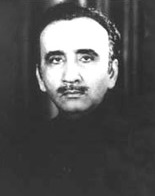
Back محمد خان جونيجو Arabic محمد خان جونيجو ARZ Məhəmməd Xan Cunedco AZ Мухамад Хан Джунеджа BE Muhammad Khan Junejo German Muhammad Khan Junejo Spanish محمد خان جونیجو FA Muhammad Khan Junejo Finnish Muhammad Khan Junejo French मुहम्मद खान जुनेजो HI
Mohammad Khan Junejo | |
|---|---|
محمد خان جونیجو | |
 Junejo in 1986 | |
| 10th Prime Minister of Pakistan | |
| In office 24 March 1985 – 29 May 1988 | |
| President | Muhammad Zia-ul-Haq |
| Preceded by | Zulfikar Ali Bhutto (1977) |
| Succeeded by | Benazir Bhutto |
| Minister of Defence | |
| In office 24 March 1985 – 29 May 1988 | |
| Minister of Interior | |
| In office 15 April 1985 – 21 May 1985 | |
| Preceded by | Lt.Gen F.S. Khan Lodhi |
| Succeeded by | Aslam Khan |
| Minister of Railways | |
| In office 5 July 1978 – 23 April 1979 | |
| Preceded by | N. A. Qureshi |
| Succeeded by | Major-General Jamal Said Khan |
| In office 1965–1969 | |
| President | Ayub Khan |
| Preceded by | F.M. Khan |
| Succeeded by | Admiral S.M. Ahsan |
| Minister of Health, Communications and Labour | |
| In office 1963–1965 | |
| President of Pakistan Muslim League | |
| In office 23 March 1985 – 29 May 1988 | |
| Preceded by | Chaudhry Zahoor Elahi |
| Succeeded by | Pir Pagara |
| Personal details | |
| Born | Mohammad Khan Junejo 18 August 1932 Sindhri, Sind Division, Bombay Presidency |
| Died | 18 March 1993 (aged 60) Baltimore, Maryland, United States |
| Cause of death | Leukemia |
| Resting place | Sindhri, Mirpur Khas District, Sindh, Pakistan |
| Citizenship | |
| Political party | Pakistan Muslim League (1962–1988) |
| Other political affiliations | Pakistan Muslim League (J) (1988–93) |
| Spouse | Begum Junejo |
| Children | Fiza Junejo (daughter), Asad Junejo (son) |
| Alma mater | St. Patrick's College Plumpton College, United Kingdom |

Mohammad Khan Junejo[a] (18 August 1932 – 18 March 1993) was a Pakistani politician and statesman who served as the tenth Prime Minister of Pakistan from 1985 to 1988 under president Muhammad Zia-ul-Haq.[1] During his tenure as prime minister he sought to strengthen the power of the office and assert civilian control over state affairs, foreign affairs and military appointments, coming into conflict with Zia-ul-Haq and various senior military officers eventually culminating in his dismissal by Zia.[2][3][4] His inquiries into the Ojhri Camp Disaster, appointment of Aslam Beg as VCOAS, various Corps Commanders, growing control over senior military promotions, forays into international politics, rejecting Zia appointments in his cabinet, stance against martial law, austerity policies and purported spying on Zia through the civilianized Intelligence Bureau all contributed to the souring in their relation.[3][5]
Junejo was an influential landowner and involved in the agricultural industry. He was educated in Karachi, where he attended the St. Patrick's College, and was trained as an agriculturist at Agricultural Institute, Plumpton College in the United Kingdom. He gained public notice when he joined the Ayub administration and subsequently held cabinet portfolio of railways, health, communications and labour from 1963 to 1969.[6]
After participating in the 1985 elections, he was chosen to form the government on Pakistan Muslim League's platform, of which, he took over the party's presidency. His government was noted for its support of conservatism, austerity measures that reduced the government budget deficit, and repealing of the emergency laws which allowed the freedom of press and media in the country.[7] Despite strong resistance and fierce opposition from President Zia-ul-Haq, Junejo authorized his Foreign Minister Zain Noorani to sign and ratify the Geneva Accords in 1988. His relations with President Zia-ul-Haq further soured when he opened a parliamentary inquiry on the Ojhri Camp disaster in 1988.[8][9] On 29 May 1988, Prime Minister Junejo was dismissed by President Zia over charges on incompetence and economic stagflation and immediately called for new general elections. After the general elections held in 1988, he led his own faction while holding ceremonial party's presidency.[10]
Cite error: There are <ref group=lower-alpha> tags or {{efn}} templates on this page, but the references will not show without a {{reflist|group=lower-alpha}} template or {{notelist}} template (see the help page).
- ^ "New Straits Times - Google News Archive Search". news.google.com. Retrieved 22 October 2020.
- ^ Cite error: The named reference
:5was invoked but never defined (see the help page). - ^ a b Cite error: The named reference
:1was invoked but never defined (see the help page). - ^ Cite error: The named reference
:3was invoked but never defined (see the help page). - ^ Cite error: The named reference
:6was invoked but never defined (see the help page). - ^ Kadri, Syed Shameem Hussain (1990). Judges and Politics: Ghulam Mohammad to Ghulam Ishaq. Jang Publishers.
- ^ Khalid, Hanif. "muhammad-khan-junejo". Gallery. Archived from the original on 31 July 2017. Retrieved 24 July 2017.
- ^ Iqbal, Syed Jawaid (1988). Third World International. S. J. Iqbal. pp. 11–48.
- ^ Malik, Anas (22 October 2010). Political Survival in Pakistan: Beyond Ideology. Routledge. p. 98. ISBN 978-1-136-90419-6.
- ^ From SARC to SAARC: 1983-1989. South Asian Association for Regional Cooperation. 1988. p. 14.